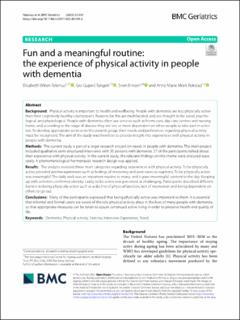| dc.contributor.author | Telenius, Elisabeth Wiken | |
| dc.contributor.author | Tangen, Gro Gujord | |
| dc.contributor.author | Eriksen, Siren | |
| dc.contributor.author | Rokstad, Anne Marie Mork | |
| dc.date.accessioned | 2024-04-12T08:24:13Z | |
| dc.date.available | 2024-04-12T08:24:13Z | |
| dc.date.created | 2022-06-15T09:03:57Z | |
| dc.date.issued | 2022 | |
| dc.identifier.citation | Telenius, E.W., Tangen, G.G., Eriksen, S. et al. Fun and a meaningful routine: the experience of physical activity in people with dementia. BMC Geriatr 22, 500 (2022). | en_US |
| dc.identifier.issn | 1471-2318 | |
| dc.identifier.uri | https://hdl.handle.net/11250/3126222 | |
| dc.description.abstract | Background: Physical activity is important to health and wellbeing. People with dementia are less physically active than their cognitively healthy counterparts. Reasons for this are multifaceted, and are thought to be social, psychological, and physiological. People with dementia often use services such as home care, day care centres and nursing home, and according to the stage of disease they are less or more dependent on other people to take part in activities. To develop appropriate services to this patient group, their needs and preferences regarding physical activity must be recognized. The aim of the study was therefore to provide insight into experiences with physical activity in people with dementia.
Methods: The current study is part of a larger research project on needs in people with dementia. The main project included qualitative semi-structured interviews with 35 persons with dementia. 27 of the participants talked about their experience with physical activity. In the current study, the relevant findings on this theme were analysed separately. A phenomenological hermeneutic research design was applied.
Results: The analysis revealed three main categories regarding experiences with physical activity. To be physically active provided positive experiences such as feelings of mastering and post-exercise euphoria. To be physically active was meaningful. The daily walk was an important routine to many, and it gave meaningful content to the day. Keeping up with activities confirmed identity. Lastly, to be active was perceived as challenging. Participants described different barriers to being physically active such as a decline of physical function, lack of motivation and being dependent on others to go out.
Conclusions: Many of the participants expressed that being physically active was important to them. It is essential that informal and formal carers are aware of the role physical activity plays in the lives of many people with dementia, so that appropriate measures can be taken to assure continued active living in order to preserve health and quality of life. | en_US |
| dc.language.iso | eng | en_US |
| dc.publisher | BioMed Central (BMC) | en_US |
| dc.relation.uri | https://doi.org/10.1186/s12877-022-03149-6 | |
| dc.rights | Navngivelse 4.0 Internasjonal | * |
| dc.rights.uri | http://creativecommons.org/licenses/by/4.0/deed.no | * |
| dc.subject | need | en_US |
| dc.subject | experience | en_US |
| dc.subject | interview | en_US |
| dc.subject | exercise | en_US |
| dc.subject | physical activity | en_US |
| dc.subject | dementia | en_US |
| dc.title | Fun and a meaningful routine : the experience of physical activity in people with dementia | en_US |
| dc.type | Peer reviewed | en_US |
| dc.type | Journal article | en_US |
| dc.description.version | publishedVersion | en_US |
| dc.rights.holder | © The Author(s) 2022. | en_US |
| dc.source.pagenumber | 1-10 | en_US |
| dc.source.volume | 22 | en_US |
| dc.source.journal | BMC Geriatrics | en_US |
| dc.identifier.doi | 10.1186/s12877-022-03149-6 | |
| dc.identifier.cristin | 2031915 | |
| dc.source.articlenumber | 500 | en_US |
| cristin.ispublished | true | |
| cristin.fulltext | original | |
| cristin.qualitycode | 1 | |

